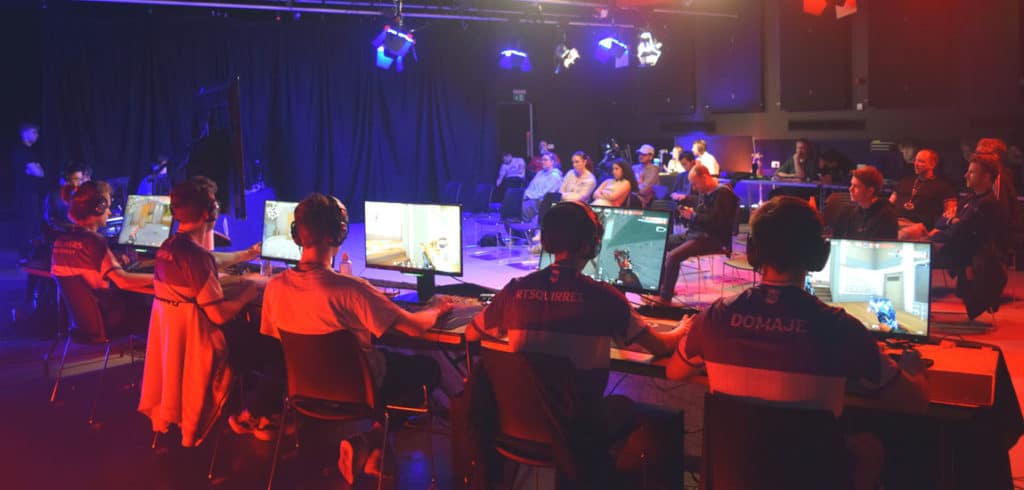A new report has looked into the value of studying an esports degree, having surveyed students in the UK, US, France, Germany and Brazil.
It found that 44% of respondents were likely to consider pursuing a degree in an esports-related field, with 55% believing this would enhance their chances of employment in the industry. Of this 55%, a fifth (20%) said it was very likely to enhance, and 35% said it was somewhat likely to enhance.
45% were less convinced, saying it was neither likely nor unlikely, somewhat unlikely to enhance, very unlikely to enhance, or don’t know.
Elsewhere, 69% believed that having an esports-related degree would be valuable to employers in the future.
42% believed they are likely to work in the esports industry in the future, with Health and wellness (29%), Entertainment and Broadcasting (25%), Education (24%), and Players’ management (23%) being the most popular occupations.
The 16-page report explored various areas of the relationship between education in esports and the industry’s current job market, focusing on the supply and demand of degree offerings to job openings.
The data came from a survey of 1,000 16-19 year olds interested in esports, commissioned and conducted by market research company OnePoll.
The report, titled ‘‘Esports Degrees Playing Field: What Prospective Students Want, Esports Sector Needs, and Academia Can(‘t) Provide’, was published by esports and gaming technological solutions developer ex corp.
It stated that there are 70+ bachelor’s (56) and master’s (17) degree programs in esports available in Europe, North America, and Asia, with 36 of them based in the US and 18 in the UK.
The closing pages of the report note that ‘there is a considerable disproportion in the number of students enrolled in esports degree programs and the number of vacancies available’ and that ‘esports is still a very young industry’ where ‘its job market demand is uncertain’.
“A trend we’ve noticed is that a lot of graduates will apply for multiple roles with seemingly no clear focus in mind, and the only consistency is that it’s an esports company role. I expect and hope we see more specialisation from professionals at all levels, as this would make a big difference.”
Sam Cooke, Esports Insider
The findings were given further context and insight from leading industry voices such as Alban Dechelotte (CEO at G2 Esports), Sam Cooke (Managing Director and Co-Founder at Esports Insider), Oleksii Kucherov (COO at Natus Vincere), and Khalilah El-Amin (Vice President of People & Culture at Team Liquid).
The latter half of the report considers the current expectations of the industry for prospective applicants, and how they have shifted with the financial difficulties in the recent ‘esports winter’.
Timofey Sobolevskiy, Chief Communications Officer at ex corp. said: “We are delighted to release this report exploring a vital topic for the future of our industry. The recent growth of esports degrees and esports in education more widely means there is no better time to explore what the future looks like for both education in esports and esports in education.
“It is vital that both employers and those entering higher education understand the value of esports degrees and the options available, as there really isn’t a one-size-fits-all approach for both sides of the coin.”
Alban Dechelotte, CEO at G2 Esports, added: “If I were asked by the students what is the best way to enter esports, I probably would never answer ‘do an esports degree’. I will most likely say, ‘do the best degree you can in your biggest skill so you can become a world-class professional in your area’. This report takes an important look into the future of esports careers and what employers like us at G2 Esports are looking for when it comes to hiring new talent.”
Sam Cooke, MD and Co-Founder at Esports Insider, commented: “A trend we’ve noticed is that a lot of graduates and younger / junior-level applicants (and mid-level too, to a degree) will apply for multiple roles with seemingly no clear focus in mind, and the only consistency is that it’s an esports company role.
“I expect and hope we see more specialisation from professionals at all levels, as this would make a big difference.”
You can read the condensed and full versions of the report at excorp.gg/esports-degrees
Top Gambling & Casino Guides
Explore some of our most popular casino, betting, and gaming guides, trusted by UK players this year.
- Top Casinos Not on Gamstop
- Fast Payout Online Casino
- UK Best Online Casinos for 2025
- Top-Rated Crypto Casino Sites in 2025
- New Casinos 2025

Dom is an award-winning writer and finalist of the Esports Journalist of the Year 2023 award. He has almost two decades of experience in journalism, and left Esports News UK in June 2025.
As a long-time gamer having first picked up the NES controller in the late ’80s, he has written for a range of publications including GamesTM, Nintendo Official Magazine, industry publication MCV and others. He also previously worked as head of content for the British Esports Federation.


